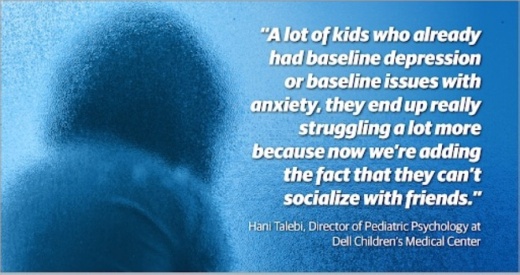Erin Basalay, chief operating officer of Rock Springs Hospital in Georgetown, said the hospital has seen more cases of increased anxiety and depression in young people since mid-March.
“We're seeing that whether or not a child or adolescent had a pre-existing anxiety or depressive diagnosis, a lot of the byproducts of COVID-19 in terms of being cut off from their typical social supports and social structure with schools and friends, [or] just being able to sort out of the house more freely, has been very stressful for children and adolescents," Basalay said.
She added in particular the hospital is seeing an increase in suicidal tendencies in teenagers, whether it is expressing a thought, plan or actually following through and hurting themselves.
Basalay said it is particularly important for children and adolescents to get out the house for developmental purposes, such as learning social cues and developing a personality, but it is difficult when they are required to stay inside, sometimes feeding off the stress and tension from their parents or caregivers, who too are dealing with stressful times.
“It's been sort of an unfortunate byproduct of coronavirus—to keep people safe, but then you're also keeping these adolescents and kids in an environment that feels very restrictive for them,” Basalay said.
Hani Talebi, director of pediatric psychology at Dell Children's Medical Center in Austin, also said play and social interactions outside the home, which have been hindered by the pandemic, are particularly important for children and adolescents.
“There's a movement in many different circles right now to shift the language of social distancing to distance socializing,” Talebi said. “I think what's happened is a lot of people feel like we can't socialize anymore with these mandates in place ... when in reality, there's still many, many options in the way of being able to socialize responsibly.”
He emphasized the importance of routine for children during this time. Talebi said with all the uncertainty of how life will be impacted or when the new normal will feel normal, if kids have a routine, they feel safe and are less likely to act out.
Talebi said Dell Children’s may not have seen more cases in the mental health department, but they were “kicked up a notch.”
“A lot of this increased [symptoms] are because of the additional layer of anxiety from COVID[-19],” Talebi said. “A lot of kids who already had baseline depression or baseline issues with anxiety, they end up really struggling a lot more because now we're adding the fact that they can't socialize with friends, which could be a really big coping strategy for them.”
Ultimately, Basalay and Talebi recommend parents talk to their kids, keeping the line of communication open, and to reach out when outside help is needed.
Basalay and Talebi said both Rocks Springs and Dell Children’s are also offering telehealth options for patients and families, which have had positive impact in increased access.
Rock Springs provides mental health services and addiction treatment in both inpatient and outpatient settings, according to its website. Dell Children’s has licensed staff on call 24 hours a day to address the behavioral and mental health needs of children and their families.
May is Mental Health Awareness Month nationwide.
“Parents, if you hear something alarming, if the kid is saying, ‘Yeah, I'm really struggling’ or ‘I'm thinking about hurting myself’ or ‘I just can't get these feelings of worry and dread under control,’ then seek some help,” Basalay said. “Don't let it continue to fester.”





